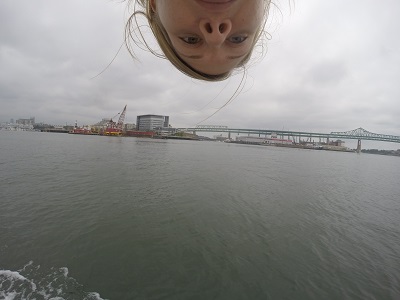Ashley Cryan, Ecology, Evolution and Marine Biology PhD candidate, sits down with the College of Science Graduate Program staff to talk about what it’s like to work and study at Northeastern University.
Please describe your research.
As a PhD student in the Helmuth Lab at Northeastern University, I am interested in the potential of hybrid gray-green infrastructure to produce win-win scenarios for both people and nature, particularly in light of addressing projected risks from climate change and restoring functional marine ecosystems in urban waterways. I study biodiversity on artificial elements in the urban intertidal zone, toward the goal of learning how the structure of the land-water interface can be strategically designed to facilitate ecosystem functioning, maximize ecosystem service benefits, and to create equity in public access and enjoyment for local communities. The overarching goal of my research is to contribute to the development of a versatile conceptual framework for implementing Living Shorelines projects in urban waterways, and thereby inform the application of marine ecological principles in shoreline design.
What is your favorite part about Northeastern?
As a coastal ecologist, it’s rare to have the opportunity to access both your laboratory space and field sites within such close proximity! Northeastern’s marine science laboratory in Nahant is one of few premiere marine research stations located close to a major US city, and with an explicit focus on urban coastal sustainability.
Why did you choose to attend Northeastern?
I greatly admire the work that my advisor, Brian Helmuth has done so far in bridging the gap between climate change research and finding ways to share fundamental messages with key stakeholders in relatable and inclusive ways. Dr. Helmuth is appointed in both the Department of Marine and Environmental Sciences and the School of Public Policy and Urban Affairs, so having the ability to knit together aspects of both fields was important to me as a graduate student interested in social-ecological systems research.
What is your favorite part of Boston?
To be honest, I don’t love Boston (this weather is really difficult for me!) but I do love the relationships I’ve forged with my peers and PhD committee members which I know will carry me forward throughout my career. I’ve met so many creative, insightful people willing to share their expertise and work through problems in novel fields. Maybe the best part of Boston is that it attracts driven people with whom it’s easy to connect.
What are the perks of being a Northeastern graduate student?
Access to a wide-ranging network of professionals through the established relationships the University’s co-op program has created.
What advice would you give to an incoming graduate student?
Before you start, be critical about the program you’re considering entering – find out all you can about the class requirements, timing and structure of program milestones (i.e. qualifying exams, proposal defense, dissertation defense), and personalities of your potential advisor and labmates. These day-to-day interactions can be just as important to your experience if not more so than having an “end goal” which is likely to change anyway in the course of your PhD. That being said, I think it’s really powerful to go in knowing what the prospects are in your field upon graduating with the degree you’re considering, and a great way to do this is to introduce yourself to people with jobs that sound interesting and set up informational interviews. One piece of advice I got when I was accepted to the PhD program was to write a list of personal and professional goals you want to accomplish in grad school – it’s helpful to glance at to remind yourself of the “why’s” when you’re in the inevitable challenging periods.
What are your plans after degree completion?
The traditional pathways for a person with a PhD are in academia, industry or government. While I am not excluding any of these options, I’m leaning away from a faculty position and more toward an applied design role. With expertise on the ecological value of shoreline structures, I could see myself working with coastal property owners from the municipal to individual scale to determine economically feasible, scale appropriate, socially equitable, resilience-oriented, and ecologically founded plans for shoreline infrastructure networks. To do so, I aim to work for a design firm and start one of my own down the line.

